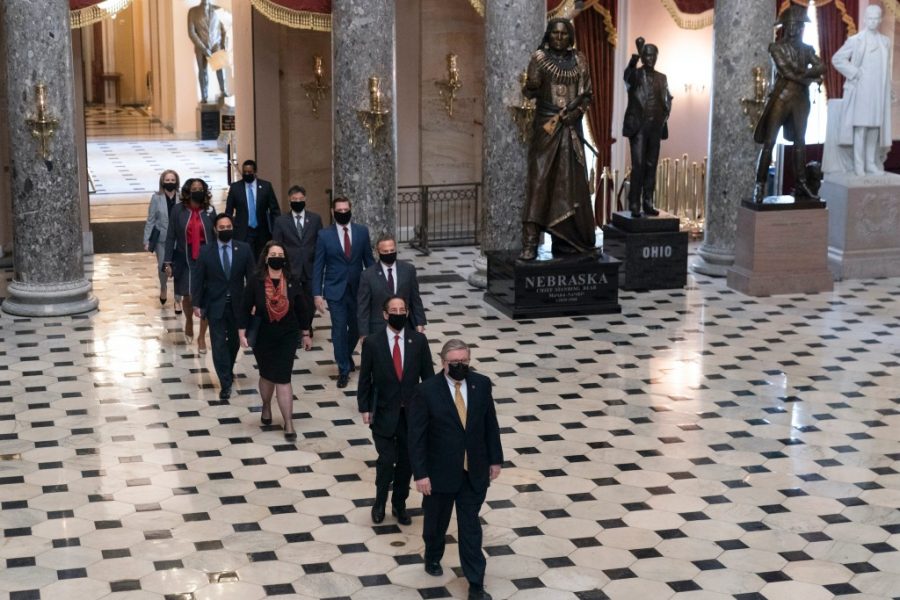University Comments on Trump’s Second Impeachment Trial
The second impeachment trial of former President Donald Trump ended again in his acquittal on Saturday, Feb. 13.
After several days of oral arguments, the Senate voted 57-43 to find Trump not guilty, with all but seven Senate Republicans voting to acquit Trump, thwarting the efforts of House impeachment managers to hold the former president accountable for his role in the riots at the Capitol last month, according to NPR. This acquittal comes after many Republicans in the Senate publicly denounced the riots at the Capitol.
“While many Senators, on both sides of the aisle, condemn what happened on Jan. 6th, few Republicans think that Trump is responsible for what happened,” said Monika McDermott, a political science professor at Fordham.
The House of Representatives impeached Trump for the second time on Jan. 11, a week after the deadly insurrection at the Capitol that occurred on Jan. 6. The Senate’s trial only began on Feb. 9, after President Joe Biden had already been inaugurated and Trump had left office. Trump has become the only American president to be impeached more than once.
According to the New York Times, Speaker of the House Nancy Pelosi chose nine Democrats to be impeachment managers, with Rep. Jamie Raskin of Maryland leading the prosecution. The prosecution’s strategy was to make the case that Trump’s rally in front of the White House on Jan. 6 encouraged the insurrection at the Capitol building later that day. Overall, they aimed to prove that Trump had run a long campaign to discredit the election results leading directly to the riots at the Capitol.
The defense, led by Bruce Castor Jr. and David Schoen, aimed to prove Trump’s speech on Jan. 6 as well as his previous statements respecting the 2020 presidential election were legal and protected as free speech under the First Amendment, according to the New York Times. They also tried to discredit the entire trial, arguing that it is unconstitutional to try a president that is no longer in office. This position is disputed by many legal scholars.
The defense was speedy in presenting its argument, using only three out of 16 hours allotted for its statements, according to the New York Times. Castor and Schoen centered their case around Trump’s comments being protected under freedom of speech. They argued that when Trump stated, “We fight like hell. And if you don’t fight like hell, you’re not going to have a country anymore” on Jan. 6, the word “fight” was merely a figure of speech and that he did not literally mean to call for violence.
Trump’s defense team also alleged that Trump was a victim of a witch hunt carried out by his political enemies, a sentiment repeated by Trump himself in the aftermath of his acquittal, according to NPR.
Alternatively, the prosecution argued that Trump’s actions had grave consequences. One of the most memorable features of the trial was the prosecution releasing new footage and audio from inside the Capitol building on Jan. 6. In the videos, Congress members are rushed to safety as the mob breaches the building, windows are shattered and the Capitol Police are visibly overwhelmed. The videos are graphic and caused many Senators to turn away or flinch, according to the New York Times.
McDermott said that this recent impeachment trial was noticeably distinct from Trump’s previous impeachment saga. “This impeachment [was] different from previous impeachments in two ways,” said McDermott. “It [was] the first of the modern era to go to actual trial in the Senate (what passed for a trial in Trump’s first impeachment was not actually a full vetting). As such, it’s the first at which full video and audio presentations are being aired, and they are very affecting.”
Despite the powerful case made by the House impeachment managers, Trump’s acquittal remained unsurprising.
“I anticipate[d] there [would] be a few Republican Senators who [would] vote to impeach, but it [wouldn’t] be enough to convict,” said College Democrats President Claire McDonnell, FCRH ’21.
The College Republicans failed to provide comments in time for publication.
Robert Hume, chair of Fordham’s political science department, said that though the trial ended in another acquittal, it was still a worthwhile effort by Congress to hold Trump accountable for his alleged encouragement of violence at the Capitol. “I think it was important for the House to proceed with the second impeachment because otherwise they risked sending the message that what [former] President Trump did was okay,” said Hume. “While it might have been easier for Congress to have censured the president and been done with it, the message would not have carried the same force.”

Isabel Danzis is a senior from Bethesda, Md. She is double majoring in journalism and digital technologies and emerging media. The Ram has been a very...










































































































































































































